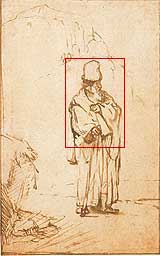Righteous Indignation
After a long journey, Elijah arrived at Mount Horeb. It was here that he encountered the Almighty:
Then the word of the Lord came to him. He said to him, "Why are you here, Elijah?" He replied, "I am moved by zeal for the Lord, the God of Hosts, for the Israelites have forsaken your covenant, torn down Your altars, and put Your prophets to the sword. I alone am left, and they are out to take my life." (I Kings19: 9)
God initiated the discussion by asking Elijah, "Why are you here? His intention was to help Elijah understand why he had come to Mount Horeb. Elijah, self-absorbed, responded by expressing his personal outrage, at the hopelessness of Israel. He felt alienated and alone. Subconsciously, he questioned his self worth and the effectiveness of his leadership. In an effort to shift the focus, God appeared to him through a symbolic theophany at Horeb. The stage was set for a repeat performance of God's revelation to Moses at Horeb. At Horeb that Moses pleaded to understand the ways of God in dealing with humankind and came to accept the limitations of his understanding:
O let me behold Your Presence! And He answered, "I will make all My goodness pass before you, and I will proclaim before you the name Lord, and I will grant the grace that I will grant and show the compassion that I will show. But, "He said, "You cannot see My face, for man may not see Me and live." And the Lord said, "See, there is a place near Me. Station yourself on the rock and, as My Presence passes by, I will put you in a cleft of the rock and shield you with My hand until I have passed by. Then I will take My hand away and you will see My back; but My face must not be seen. (Exodus 33:18-23)
Moses was granted a glimpse of God's essence. The elusive nature of the divine defies man's grasp. However, God's presence was described in terms of grace and compassion. Moses assimilated these virtues and engaged in imitatio Dei, as he manifested great compassion toward his nation. Elijah, at Horeb did not openly demand God to reveal His Presence, but God symbolically demonstrated his attributes through a personal theophany to Elijah:
Come out," He called, "and stand on the mountain before the Lord." And lo, the Lord passed by. There was a great and mighty wind, splitting mountains and shattering rocks by the power of the Lord; but the Lord was not in the wind. After the wind -- an earthquake; but the Lord was not in the earthquake. After the earthquake -- fire; but the Lord was not in the fire. And after the fire -- a still small voice. (I Kings 19:9-12)
Elijah was positioned on the mountain before the Lord. The divine presence passed before him in the form of God's natural forces of wind, earthquake and fire, followed by a still small voice. God's immanence was experienced in the contrast between forcefulness and gentleness -- justice versus compassion. God was hopeful that Elijah would intuit the response of his mentor Moses; swallow his righteous indignation, humbly accept his limited understanding, and petition for the forgiveness of his nation.
God addressed Elijah once more: "Why are you here Elijah"? The rabbis piped in the script we would have liked to hear:
Why do you think I have brought you here Elijah? So that you should say to the Master of the Universe these are your children, your beloved sons, the sons of Abraham Isaac and Jacob who do Your will in this world. But not only did he not say this rather he exclaimed, "I am moved by zeal for the Lord, the God of Hosts, for the Israelites have forsaken your covenant. (Tanna devei Eliahu Zuta 8).
Yet startlingly, Elijah parrots his initial response verbatim:
I am moved by zeal for the Lord, the God of Hosts, for the Israelites have forsaken your covenant, torn down Your altars, and put Your prophets to the sword. I alone am left, and they are out to take my life. (I Kings19: 9)
His rigid outlook had not changed. He felt alone and threatened. Rather than evoking mercy, Elijah reached the end of the road. He was incapable of accepting the people with their faults, unable to make any concessions.
Midrash Song of Songs Rabbah describes the frustrating impasse as follows:
I am moved by zeal for the Lord the God of Hosts for the Israelites have forsaken your covenant -- God said to him My covenant? Perhaps it is your covenant?!? They have torn down Your altars? He said to him My altars? Perhaps they are your altars?!? And put your prophets to the sword? And he said to him My prophets? What do you care? Elijah I cannot tolerate your prophecy! (Song of Songs Rabbah 1:38)
This remarkable passage paints Elijah as far more stringent than the Lord Himself in his expectations of the people. Elijah was renowned for championing the honor of the Lord. His disdain for the people did not allow him to serve them without, as he saw it, compromising his fidelity to God. The time had come for God to appoint another man for the job
A Still Small Voice >>